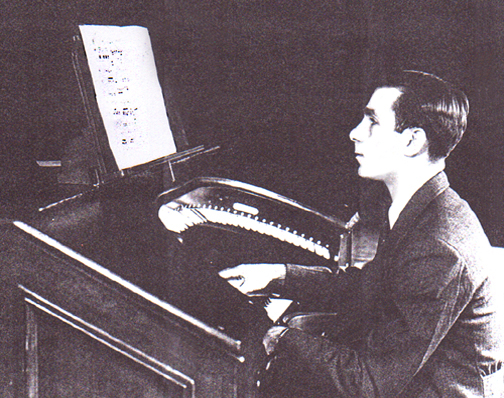Recently I chatted with Mrs. Carsie Lodter about the time her late husband, Prof. Edward Lodter, played the Majestic Theatre’s Wurlitzer organ after it was relocated to Milligan College for a weekly WJHL radio broadcast.

Mrs. Lodter said the organ was constructed in 1926 in North Tonawanda, NY with two manual keyboards and 511 tubes (seven racks with each containing from 61 to 97 individual pipes). The unit arrived in the city from Cincinnati on a Southern Railway train. Company technicians placed the pipes in concrete lined chambers that were bored into the walls of the theatre.
“The Majestic once provided a regular offering of silent films,” said Mrs. Lodter. “The new organ provided background music to supplement the action being shown on the screen. It produced numerous special effect sounds such as a train whistle, airplane, ocean surf, sirens, bells and horses hoofs. When ‘talkies’ began to appear in 1927, the need for the organ diminished. It was then used for patriotic sing-alongs, organ concerts and recitals.
“About that time, theatre owner, Mrs. George W. Keys, a faithful patron of Milligan College, became interested in cultural pursuits and sought to establish a memorial for her late husband. She donated the idle organ to the college where it was installed in Derthick Hall auditorium.”
The “George W. Keys Memorial Organ” became a welcomed addition to the cultural dimension of the college community. Edward G. Lodter, professor of foreign languages and an accomplished organist, contributed his talents by playing the organ for daily chapel services, special recitals and as accompaniment for vocalists, musical groups and instrumentalists at the school.
When WJHL opened a radio station on S. Roan Street in 1938, Mrs. Lodter’s father, Sam Hyder, a math professor at Milligan, was instrumental in getting a live broadcast aired from the college as a gift to the community. “The Milligan College Hour of the Air” was likely the first regular on-site remote broadcast from the new station.
Each Sunday afternoon while school was in session, the auditorium became a makeshift broadcast studio. A WJHL technician and Professor Hyder worked jointly to ensure that the necessary equipment was in place before each live program. Hyder kept a notebook of the contents of the 72 programs broadcast from Dec. 18, 1938 until Dec. 8, 1940. No programs were aired during summer months.
Eddie Cowell, a young budding announcer, became the program’s master of ceremonies. He discussed current events that were taking place on the campus and occasionally turned the mike over to college president, Henry J. Derthick or other campus administrators. However, the main program was a vesper service of organ music rendered by Professor Lodter. He chose as his theme song the very beautiful “Traemerii, Opus 15, No. 7” by Robert Schumann.
Selections were primarily classical, but also included familiar hymns, popular songs and spirituals. The professor occasionally invited talented music students and alumni to join him on the air. WJHL offered listeners the opportunity to request a selection or ask for an encore.
After the program went off the air, the organ remained essentially idle until it was restored by the college and used in chapel. In 1972, it was sold to Roy Davis, owner of the Cumberland Caverns in McMinnville, Tennessee for home use. Sadly, his house and contents were destroyed by fire in 1998.
Mrs. Lodter hopes that this column will bring back pleasant memories from some of the area’s oldest music lovers who remember “The Milligan College Hour of the Air.”
